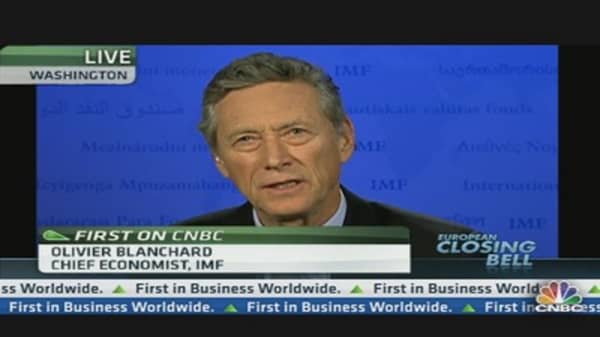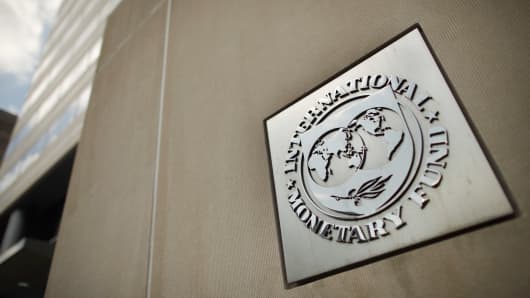Global growth for 2013 will now be lower than previous estimates, according to the International Monetary Fund, as the sovereign debt crisis in Europe continues to pose a large downside risk to the economy.
World output, which was 3.2 percent last year, will again be weighed down by continuing problems in Europe and is predicted to be 3.5 percent this year, down from 3.6 percent in its last forecast.
The IMF now expects the euro zone to contract 0.2 percent in 2013, instead of a 0.2 percent expansion predicted in October.
"We're going back to a good place, but we're going back to that good place very slowly," Olivier Blanchard, chief economist at the IMF, told CNBC Wednesday.
Estimates for Germany and Italy have changed the most, with the IMF suggesting that German growth will now be 0.6 percent instead of 0.9 percent. Italy, which will hold elections next month, will see a slide of 1 percent, compared to a decline of 0.7 percent in October's forecast. The U.S. meanwhile is set to see 3 percent growth this year, up from earlier estimates of 2.9 percent.
"The near-term outlook for the euro area has been revised downward, even though progress in national adjustment and a strengthened EU-wide policy response to the euro area crisis reduced tail risks and improved financial conditions for sovereigns in the periphery," the IMF said in the report.
In September, the European Central Bank chief Mario Draghi announced the Outright Monetary Transactions (OMT) program to buy the sovereign bonds of stricken euro zone members, if they applied for aid.
Yield spreads between safe-havens and struggling peripheral countries have since narrowed without the need for the OMT being rolled out.
The interest on 10-year benchmark bonds in Spain have fallen below 5 percent for the first time since February 2012 and the country's benchmark stock index has climbed around 14 percent since the ECB's announcement.
(Read More: Worries Grow as Investors Pile Into Spain)
The IMF said the delays in the transmission of these lower interest rates to the broader economy was the main reason for the cut in growth forecasts and it said there was still high uncertainty about the ultimate resolution of the crisis despite recent progress.
"In the euro area, the return to recovery after a protracted contraction is delayed," it said.
"Risks of prolonged stagnation in the euro area as a whole will rise if the momentum for reform is not maintained. Adjustment efforts in the periphery countries need to be sustained and must be supported by the center."
(Read More: IMF Says Greece May Need Another 10 Billion Euros)
The International Monetary Fund has been at the forefront of the debt crisis lending to countries such as Greece, Ireland and Portugal in unison with the European Central Bank and the European Commission.
In the report it urged greater integration in Europe and the roll out of the banking union - a plan for around 200 banks to come under the oversight of the European Central Bank, which will act as chief supervisor.
(Read More: Banking Union: First Step to Two-Speed Europe?)
Finance ministers from the euro zone reached a deal on December 13 on banking supervision, but plans don't look set to be implemented anytime soon as a common deposit guarantee and a resolution framework still need to be sorted out.
Despite the revisions, 2014 still looks set to be a better year with global growth reaching 4.1 percent, according to the report, but this assumes the recovery takes a firm hold in the euro zone economy.
"If crisis risks do not materialize and financial conditions continue to improve, global growth could be stronger than projected." the IMF said.
—By CNBC.com's Matt Clinch





